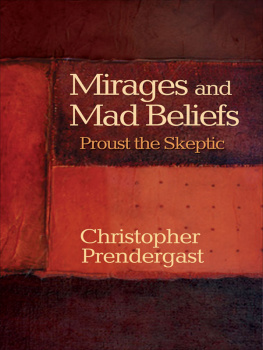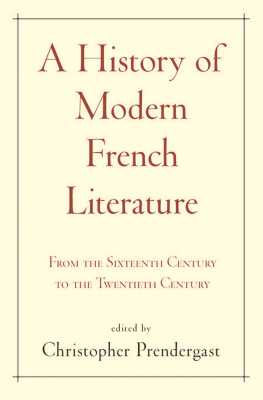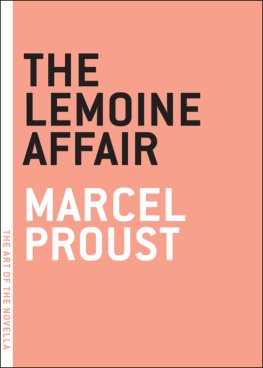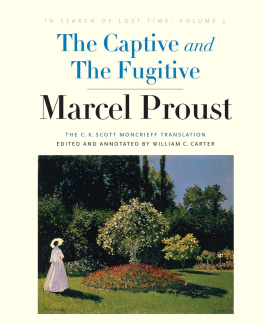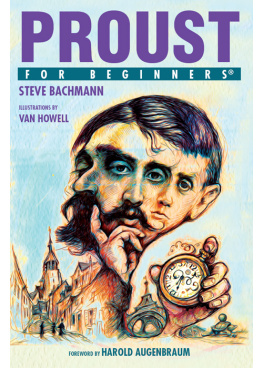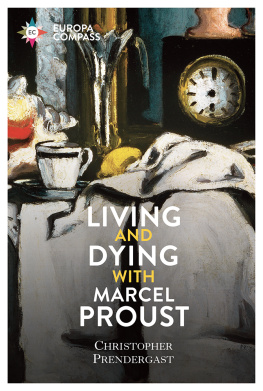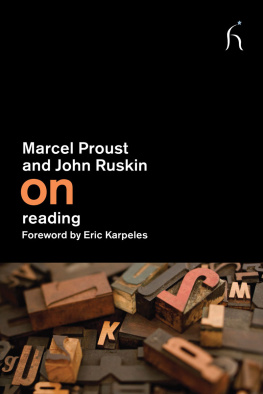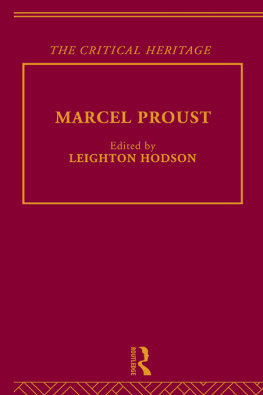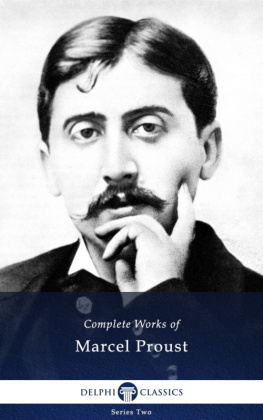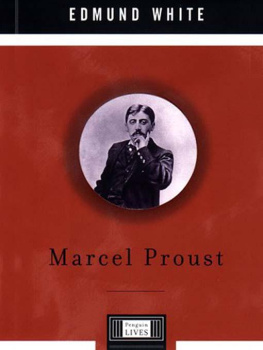
Mirages and Mad Beliefs
Mirages and Mad Beliefs
PROUST THE SKEPTIC
Christopher Prendergast
PRINCETON UNIVERSITY PRESS
PRINCETON AND OXFORD
Copyright 2013 by Princeton University Press
Published by Princeton University Press, 41 William Street, Princeton, New Jersey 08540
In the United Kingdom: Princeton University Press, 6 Oxford Street, Woodstock, Oxfordshire OX20 1TW
press.princeton.edu
All Rights Reserved
Library of Congress Cataloging-in-Publication Data
Prendergast, Christopher.
Mirages and mad beliefs : Proust the skeptic / Christopher Prendergast.
p. cm.
Includes bibliographical references and index.
ISBN 978-0-691-15520-3 (hardcover : acid-free paper) 1. Proust, Marcel, 18711922Criticism and interpretation. I. Title.
PQ2631.R63Z8275 2013
British Library Cataloging-in-Publication Data is available
This book has been composed in Sabon LT Std
Printed on acid-free paper.
Printed in the United States of America
10 9 8 7 6 5 4 3 2 1
Contents
For Jane Haynes, a good friend and true Proustian
Acknowledgments
I AM GRATEFUL TO my editors at Princeton University Press, Al Bertrand and Hannah Paul, for their unfailingly engaged and generous support, as well as to my indefatigably hawkeyed copyeditor, Cathy Slovensky, who, uniquely in my experience, also helped me turn a chore into a pleasure (not least by adding to the text some wonderful lines of her own on clowns, ponies, and jugglers). My thanks are also due to a number of friends and colleagues for their encouragement and assistance: Claudia Brodsky, Tony Cascardi, Mary Ann Caws, Ian Christie, Peter de Bolla, David Ellison, Anna-Magdalena Elsner, Margaret Gray, David Hillman, Peter Jewell, Dominique Jullien, Michael Lucey, Thomas Klinkert, Nick Marston, Eric Mchoulan, Jeremy Morris, Ian Patterson, Alexander Rgier, Ingrid Wassenaar, and Nicky Zeeman. I am also grateful to the institutions whose invitations to come talk about Proust helped in developing and shaping the arguments of the book: Princeton University, New York University, University of Miami, University of California, Berkeley, University of California, Santa Barbara, the Bellagio Foundation, and University of Bologna. Very special thanks go to Stanley Corngold and Michael Wood for extended and always illuminating exchanges. My good friend (and true Proustian) Jane Haynes has been a source of inspiration and support; I dedicate the book to her.
References and Abbreviations
ALL QUOTATIONS FROM and references to la recherche du temps perdu are to the four-volume edition (Paris: Gallimard, 198789). The English translation used is In Search of Lost Time (London: Allen Lane, 2002). I have occasionally tweaked passages quoted from the latter. Throughout I quote principally from the English translation, as some readers interested in Proust may not know French, or French to the exacting standards of Prousts original. I ruled out the compromise solution of quoting both the original and the translation on the grounds that, especially where the longer passages are concerned, this would destroy a realistically manageable rhythm of reading.
The following abbreviations are used:
ARTP la recherche du temps perdu
CG Le Ct de Guermantes
Corr. Correspondance, ed. Philip Kolb, 21 vols. (Paris: Plon, 197093)
F La Fugitive
JF lombre des jeunes filles en fleurs
P La Prisonnire
S Du ct de chez Swann
SG Sodome et Gomorrhe
T Le Temps retrouv
Mirages and Mad Beliefs
CHAPTER ONE
Mad Belief
LA RECHERCHE DU TEMPS PERDU is so constructed as to invite an argument about it to begin where it itself ends (more precisely, with that portion of the last volume occupied by the narrators lengthy meditation on the nature of the literary vocation, the section Proust baptized as LAdoration perptuelle). This would not, however, be simply to recapitulate its own internal movement on the plausible (though contested) inference that at the end the narrator is set to embark on the writing of the novel we have just read. Nor would, or should, it be to begin at the end in the external sense implied by the fact that the main ideas informing the terminal meditation were there at an early stage of Prousts writing life, prior to the composition of la recherche in the essayistic forms subsequently gathered together and published under the title Contre Sainte-Beuve. As Vincent Descombes explains, this would be to ignore the reasons why Proust, while proleptically hinting at them throughout, deferred the fully developed statement of these ideas until late in the novel; it was to ensure that the relation between Contre Sainte-Beuve and la recherche would not produce a reading of the latter as just a transposition of the former.diagnosis, part analytical, part symptomatic, of what is wrong with this construal of him as a purveyor of high-grade cultural narcotics, it is as well to have done with it once and for all.
The rationale for the approach adopted here is that there is also something in the work itself that seeks to persuade (marching under the banner of such terms as truth, a term without which the whole edifice of la recherche would collapse). Naturally, this does not mean that the persuasive ambitions of the account and those of the work are substantively identical, such that the former merely replicates the latter, albeit in a different idiom. What it means is that there is a match of ambitions in a purely formal sense. One might want to claim that this mischaracterizes la recherche, that it is an enterprise geared not to persuasion but to another set of objectives and thus another kind of writing altogether. If that is so, then the proposed account self-defeatingly loses its point. In this scenario, the only thing coherently on offer would be to recommend reading the book, the rest being silence. However, if we can reasonably debate whether Prousts novel in general conforms to this characterization, one place where its aims are indisputably rhetorical in the sense of addressing its reader with persuasive intent is the metatextual sequence of Le Temps retrouv, so often taken as housing the coda to the work as a whole. Indeed, the discourse of this sequence operates as a high-octane persuasive machine, firing on all pistons to convince us of everything that is entailed by the startling claim (in Ian Pattersons translation) from Le Temps retrouv: Real life, life finally uncovered and clarified, the only life in consequence lived to the full, is literature (189). This is not quite what Proust wrote: La vraie vie, la vie enfin dcouverte et claircie, la seule vie par consquent pleinement vcue, cest la littrature ( la recherche du temps perdu [ARTP], 4:474); while the translation makes perfect sense of the original, it is at the cost of substituting the word real for true (la vraie vie). While the expression true life falls awkwardly on English ears (as awkwardly as true love, a concept utterly alien to Prousts world), it matters that we do not lose sight of the original French here. Combining the two versions gives us a set of propositions that bring together three very grand items from the Proustian lexicon: the true, the real, and the lived.
Truth, reality, life: we shall have occasion to return to the crucial place of these terms in the novel (in the strong sense of being crux-terms, load-bearing at key junctures of the novels articulation of its own aesthetic), along with the dense equations they sustain (to the point where real, true, and lived become virtually interchangeable). But since in its bald form the proposition is especially congenial to the swooners, let me begin irreverently, with a provocative question framed by a Proustian
Next page
